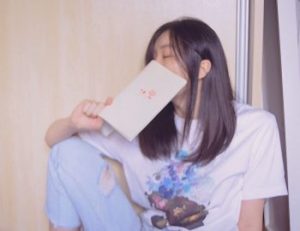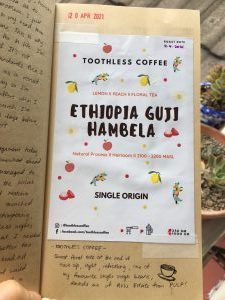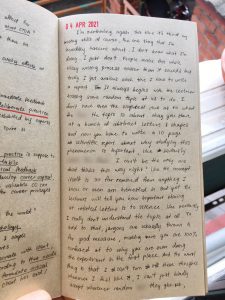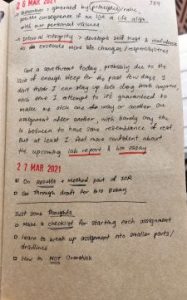
May 4, 2021, by khyx2lyn
Journaling: More than just BuJo Aesthetics
This piece is written by our first year psychology student Nicole Koh.
If you’ve spent more than 5 mins on Instagram, you’re bound to come across an aesthetically pleasing flat lay of someone’s work desk, possibly with an open journal with neat handwriting or impressive calligraphy font spread through their expensive Leuchttrum or Mossery notebook, with captions describing how they tracked their habits for the month. Often, this is the impression one conjures up when they think of the concept of “journaling”, becoming almost synonymous with the concept of keeping a diary log, at least that was how I initially viewed the activity. However, I’ve learnt a few lessons since I began journaling back in September which drastically changed my initial impressions of what journaling meant to me and why so many people (clinical psychologists included) recommend an activity that is frequently dismissed as trivial and menial in the minds of many. Thus, I will be sharing some of the key insights that I’ve gained through my journaling process which differs from the traditional impressions of journaling.
⯎
Journaling became a self-reflection log rather than a visual piece of artwork ready for Instagram rolls. What I mean by a ‘self-reflection log’ is that each time I wrote an entry, I did it with the intent on reflecting upon a particular subject instead of just writing factual accounts of the day (as typically seen in diary entries). This mindset is crucial to keep in mind while writing since most of the value people preach about when they talk about the benefits of journaling is related to this very concept, the fact that journaling provides an opportunity in your busy day to fully digest and replay all your personal thoughts and feelings regarding the events that occurred throughout your life. The subject may include an infinite spectrum of topics you’re interested in reflecting on, ranging from your favourite coffee of the month, personal life philosophies, specific childhood events, thoughts on a line uttered by an acquaintance during a meet-up that caught your attention, literally the sky is the limit. It’s also important to keep in mind that the journal itself should be treated as a safe haven for your thoughts to wander, so no censorship required (since it defeats the purpose of an honest self-reflection that only you are going to read) and if you are one to worry about invasion of personal privacy, keep the book in a place no one would ever think to look for (be creative with this).
⯎
The whole point of doing self-reflection entries is to provide yourself physical feedback to track your behaviour, thoughts, and emotional states as you go about doing life, making it easier to identity personal behaviours in need of changes or to assess fundamental causes of thought patterns inherited from events from the past (e.g. feeling a sense of distrust among teachers due to past traumatic event in a school setting). You would be surprised at the clarity of thought gained gradually from the process of having to sit down and write your thoughts out on paper. Additionally, you’ll gain more self-awareness when you reread past entries at a later date, wondering how anyone would deal with the amount of whining past you wrote. It is this concept that has naturally motivated me to keep relatively consistent entries throughout the week, to the point where I craved it during a temporary hiatus a month after I finished my first book. Journaling was especially helpful on nights when I was too anxious to sleep due to chronic overthinking about the amount of workload I still had pending. I would argue it gave back some sense of control over my day and acted as a form of emotional expression, the fact that I did this activity for no one other than myself for completely non-academic or work-related purposes felt personally liberating during times where it felt like my daily routines were purely dictated based on the next deadline.
⯎
Furthermore, the journaling design should cater according to the needs of the individual. For example, if you’re an artistic person who derives a sense of joy from drawing creative pieces in your journal, by all means, do it; whereas if you’re someone who prefers a streamlined, organised style of expression with bullet points and paragraphs, you should not feel the need to conform to what Instagram thinks ‘journaling’ is. I address these points with the knowledge that many people feel intimated at the act of picking up journaling as a habit or perhaps drop it halfway through due to the simple fact that they felt unable to maintain the intense amount of time commitment required to craft journal entries similar to those seen on social media. It really does not have to be that complicated. Perhaps you may be one of the few crippled by the vague, endless spectrum of journaling styles to the point where you feel lost as to where to start. It can be a simple as simply noting down interesting ideas or thoughts into a short point (e.g. what are the benefits of doing nothing), or as elaborate as an entire essay analysing the brand philosophy and product design of MUJI, either way, both of them count as entries for the day regardless of how long or short the entry themselves may be. Shifting from the traditional idea of journaling where one is expected to write a log every day, the individual should only journal when they feel the need for emotional expression as forcing the activity into a strict regime only imposes unnecessary pressures to write something for the sake of it which may eventually devalue the entire experience of solace obtained through journaling. A flexible schedule in combination with the freedom of topic choices work to leverage journaling to a whole new level, allowing the individual ample space to experiment and personalise journaling as an activity which serves to adapt its purpose along with changes in one’s lifestyle.
⯎
To end the article, I would like to show you a picture of my real journal to give you some ideas as to how creative and vulnerable you can be through this medium of expression, happy journaling!



-
Post a comment
